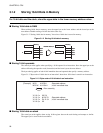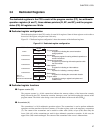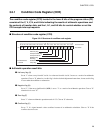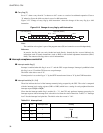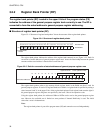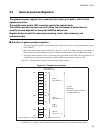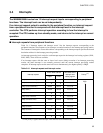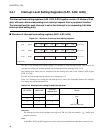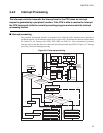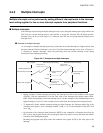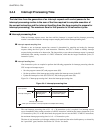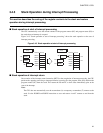34
CHAPTER 3 CPU
■ Features of general-purpose registers
General-purpose registers have the following features:
• RAM can be accessed at high-speed using short instructions (general-purpose register addressing).
• Registers are grouped in blocks in the form of register banks. This simplifies the process of saving
register contents and dividing registers by function.
Dedicated register banks can be permanently assigned for each interrupt processing or vector call (CALLV
#0 to #7) processing routine by general-purpose register. For example, register bank 4 interrupt 2.
For example, a particular interrupt processing routine only uses a particular register bank which cannot be
written to unintentionally by other routines. The interrupt processing routine only needs to specify its
dedicated register bank at the start of the routine to effectively save the general-purpose registers in use
prior to the interrupt. Therefore, saving the general-purpose registers to the stack or other memory location
is not necessary. This allows high-speed interrupt handling while maintaining simplicity.
Also, as an alternative to saving general-purpose registers in subroutine calls, register banks can be used to
create reentrant programs (programs that do not use fixed addresses and can be entered more than once)
usually made by the index register (IX).
Note:
If an interrupt processing routine changes the register bank pointer (RP), ensure that the program does
not also change the interrupt level bits in the condition code register (CCR: IL1, IL0) when specifying
the register bank.



